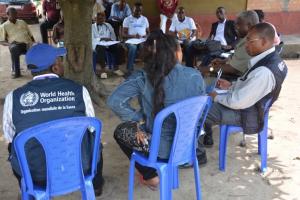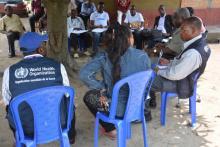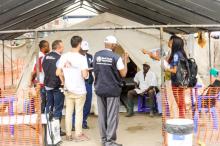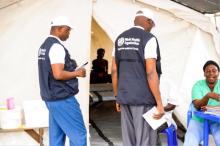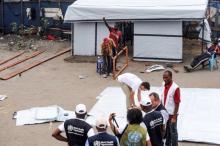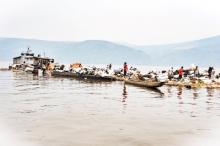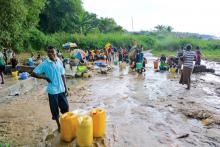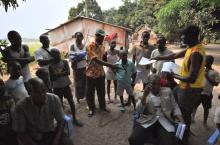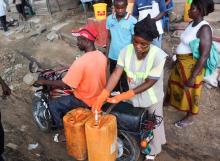WHO’s response to cholera epidemic in the Democratic Republic of Congo
DRC has, from early 2016 to September, registered a cumulative total of 18.252 suspected cholera cases, of which 516 deaths (fatality rate of 2.8%) throughout the country, particularly in the Equateur, Kinshasa, Upper-Lomami, Upper-Katanga, Maï-Ndombe, Mongala, North-Kivu, Tshopo and South-Kivu Provinces. WHO and its partners are supporting the efforts of the Ministry of Health (MOH) to quickly bring the epidemic under control. The Organization has deployed close to 40 national experts (epidemiologists, social mobilization and risk communication specialists, logisticians, water, hygiene and sanitation experts, etc.) to deal with the outbreak. Also, 30 cholera kits were distributed in the most affected provinces. Each kit comprises a medical component with 2 perfusion devices, each of a 2 000 litres capacity, and a logistical component.
In conjunction with other partners, WHO and the Ministry of Health are striving, in a multi-pronged manner, to control the epidemic efficiently. Dr Benoit Kebela, Director of Disease Control at the Ministry of Health, presided over a meeting in Maluku to assess the situation, in presence of WHO and other partners. Key response measures include, among others, better coordination, epidemiological surveillance, preventive measures and risk communication on cholera control.
WHO Epidemiologists, logisticians and risk communication specialists discuss with MSF team at the Pakadjuma cholera treatment unit (CTU), a disadvantaged neighbourhood in the Lime health area in Kinshasa.Capacity to manage more cases, be it in Kinshasa or in other affected provinces along the river remains a huge challenge facing all actors. More supplies, incentivized and trained social mobilization workers, as well as increased community participation are currently of crucial importance.
The Pakadjuma cholera treatment unit has already begun managing cases, with a capacity of about ten beds. However, because of the nearby houses, coupled with floods during heavy rains, it is feared that the disease might spread rapidly into the capital city. The Kinshasa provincial health inspectorate (PHI) has undertaken to identify other appropriate sites in Kinshasa where cholera treatment units could be set up in the event that more cases were registered.
WHO and its partners are providing local medical personnel significant medical assistance, in addition to essential medical equipment used for responding to the outbreak.
Makeshift boats, also known as "whaleboats", are the habitual means of transportation of persons and goods across the river. Often overloaded, these boats hardly guarantee any safety. Indeed they have no radio transmitter, life jackets or flare bombs. Personal and collective hygiene in these boats are very precarious and conducive to the rapid spread of cholera in an outbreak context.
On this photograph, a "whaleboat" carrying goods about to berth at the Maluku Port, south of Kinshasa.
In the Maluku health area, more than 80 km south-east of Kinshasa, access to drinking water is a major challenge for the local population. The Maluku health area and other rural areas along the Congo River are particularly exposed to outbreak risks, since they are situated in areas with numerous water bodies and poor access to drinking water and sanitation.
Supply of sufficient quantity of drinking water and intensification of sanitation activities are the best preventive measures enabling to reduce morbidity and high fatality rate due to cholera. This is not often the case in very remote areas. Below, the ‘Longange’ stream , in Maluku, from where people collect water under unsafe hygienic conditions.
In order to prevent cholera, one of the key means of sensitizing communities and travellers consists in the intensification of disinfection, awareness, and chlorination activities, and achieving commitment to and ownership of control measures by boat owners in provinces where suspected cases have been registered. WHO and its partners are supporting these actions, from Kisangani (Tshopo) to Kinshasa, through Bumba, Lisala (Mongala Province), Mbandaka, Makanza, Lolanga-Mampoko (Equateur Province) Lukolela, Yumbi, and Bolobo (Maï-Ndombe Province) so as to strengthen the capacities of communities and public authorities on a long term basis, in view of an efficient response.
It is crucial to step up preventive measures in affected communities, for instance chlorination of water in households and at water points, disinfection of toilets, dissemination of information on cholera, distribution of soap, aquatabs and oral rehydration salt, as well as increased supply of chlorinated water using water tanks. Cholera is a diarrhoeal disease that is contracted either through use of contaminated water or ingestion of infected food. These key messages are repeatedly passed by social mobilization workers. WHO, in conjunction with its partners, is supporting targeted key interventions concerning access to drinking water, hygiene and sanitation.




